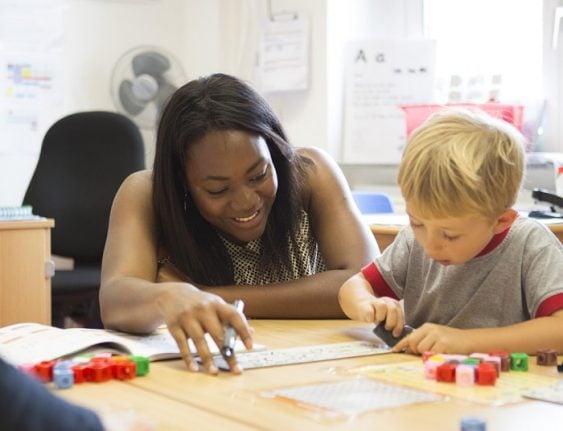But Phorms doesn’t do half measures.
Indeed, Phorms has always been committed to doing things a little differently – from revolutionary bilingual education to top-notch technology in the classroom.
Phorms Education, which introduced a new model of education in Germany ten years ago, now has seven schools in the country: in Hamburg, Berlin Mitte and Berlin Süd, Frankfurt City and Frankfurt Taunus, Munich and the Josef-Schwarz-Schule in Baden-Württemberg. They also run an additional international school in Heidelberg, H.I.S.
Today, Phorms boasts a thriving educational community that goes above and beyond the expectations and requirements of any ordinary school. And the all-day schooling system, it would seem, has had a big part to play in its success.
A winning formula
“Each individual child counts,” explains Michael Gehrig, the head of Phorms Schools in Frankfurt.
“We support and help students grow at both ends. There are students with weak spots, who need to be supported, and then there are students who are gifted – who are very curious in the world – and for these students we offer an enrichment programme.”
The all-day system allows greater flexibility in the time spent on certain subjects, bringing a host of extracurricular opportunities and educational support to students depending on their individual needs. It’s not one-size-fits-all – it’s personal.
“Our primary teachers have more flexibility in their plans as far as when they can do maths and when they can do English, or when they can extend some hours,” explains Marc Nevin, English Teacher at Phorms in Munich.
Besides teaching English, Nevin also helps coordinate the Extension and Enrichment programme in Munich – you can read all about this programme, and the additional support Phorms offers here.
“The extension and enrichment programme is kind of a dialogue and work-in-progress with the students,” Nevin says.
“It shouldn’t be another class for them necessarily, so I bring in inspiration from things that other students have done, and we try to help each other with ideas,” he continues.
“They dictate what they want to do, and we try to create this workshop atmosphere so that students can work on what they want to, the areas they want to develop.”
Building a community
Phorms schools go one step further than simply providing an all-day programme, however. They offer different afterschool workshops and activities between 4 – 6pm, and even whole-day programmes and activities for students during the holidays.
“There are lots of different types of activities available after school – from dance and judo, to chess and woodwork,” says George Betts, Extracurricular Coordinator at Phorms Campus Frankfurt City.
“There are quite often activities in the local woods, and we’ve been very proactive in astronomy and engaging the children in overnight stays – so there’s a whole range of activities that are rather diverse and quite unique.”
It is these extracurricular activities, Betts says, that help to create the close-knit educational community that everyone at Phorms, including the students and parents, value so highly.
“A big part of our community is based after school or before school,” Betts explains.
“We have a lot of parents and children who are engaged in the more social aspects of the education we offer – afterschool activities, for instance – and it brings a lot of parents together as a community. As a result of being integrated within our all-day school system, the parents are not just coming to pick up their children, they quite often form social bonds with other parents, and that develops over time.”
Inspiration meets integration
Whilst creating a strong and supportive educational community within their schools, Phorms also cares passionately about immersing the students in the local German community.
“One of the things that I find unique about Phorms is that while it is a globally minded school, it is very much rooted in the local community,” Nevin states.
“We’re rooted in the community because most of our students are local – quite a few of them have parents who have either worked or studied overseas, and want their children to have a more international education,” he continues.
“And we also have expat children whose parents want to use the experience for their children to learn more about the German culture as opposed to going to an international school where they would be a little bit more isolated from the community.”
While Phorms may pride itself on successfully immersing students in the local German community, for Michael Gehrig, it’s the international team of staff members that makes Phorms Education so unique.
“The internationally based staff – together with the German colleagues – form an excellent team, sharing all their teaching experience and techniques from around the world to become better teachers and people,” he exclaims.
“It is this marvellous and energetic team who make Phorms run.”
You can learn more about the Phorms schools and their concept at one of their information events. Click here to find out more.
This article was produced by The Local and sponsored by Phorms.




 Please whitelist us to continue reading.
Please whitelist us to continue reading.